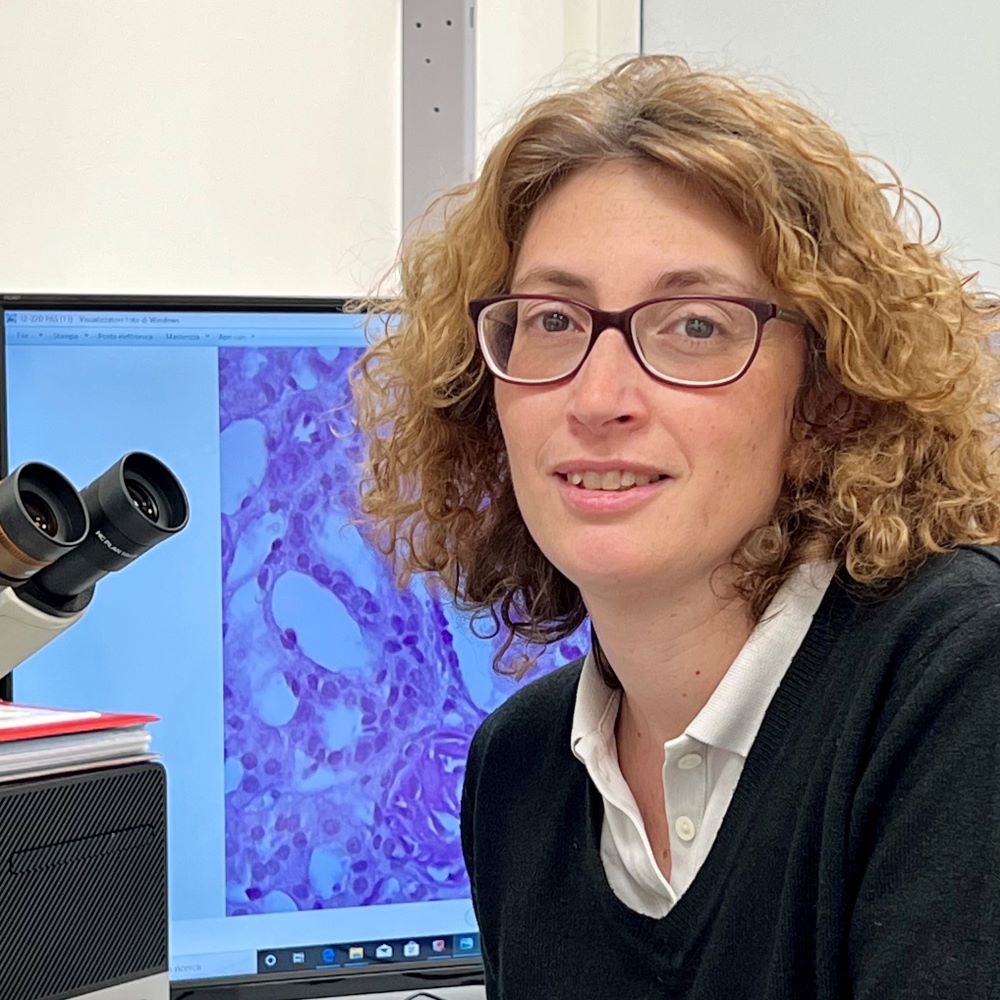Genetics and Rare Diseases Area
Immunopathology and Molecular Biology of kidney
Research Activity
The Laboratory of Immunopathology and Molecular Biology of the Kidney is part of the Pediatric Nephrology Unit, Dept. of Women’s and Children’s Health, Padua University Hospital. The Unit is a center of excellence and reference, where professionals collaborate in a multidisciplinary and comprehensive approach to take care of children with renal diseases. The Unit takes also part to international networks for diagnosing and treating rare kidney diseases, such as the European Reference Network (ERN) ERKNet and TransplantChild.
The Laboratory of Immunopathology and Molecular Biology of the Kidney provides an analysis pattern for the immune-histological classification of primary and secondary pediatric kidney and urinary tract diseases and the follow-up of pediatric kidney transplant recipients. Furthermore, the Laboratory preserves a remarkable biobank of renal tissues from transplanted and native kidneys. The Pediatric Nephrology Unit and the Laboratory carry on important scientific studies, including clinical trials as well as translational research projects, concerning kidney transplantation, acute kidney injury, dialysis, congenital abnormalities of the kidney and urinary tract (CAKUT), nephrotic syndrome and other pediatric kidney diseases.
The current main field of research of the Laboratory is the study of factors affecting the survival of kidney transplantation in the pediatric population. To date, the survival rate of a graft is about 10-20 years, a period that is too short for pediatric patients. Therefore, an effort should be made to identify factors that can negatively impact graft survival as early as possible to treat them before they disrupt renal function. To this purpose, the Laboratory collaborates with several other research groups in IRP and is committed on many topics, such as the role and the prognostic value of intrarenal positivity of viruses and the characterization of extracellular vesicles (EVs) isolated from serum and urine of transplanted children. These EVs could be useful to identify novel non-invasive biomarkers predictive of rejection before the damage is detectable in the kidney. Other two huge research projects are being carried on in collaboration with the Transplantation Immunology Lab (Prof. Cozzi) and are aimed to study the role of non-HLA antibodies in antibody-mediated rejection, one of the main causes of graft loss. More in detail, the projects are aimed at assessing the possible causative role of anti-AT1R (Angiotensin 1 Receptor) and anti-ETAR (Endothelin 1 Receptor) immunity in pediatric renal transplant failure using an innovative approach to study whether anti-HLA antibodies are associated with a particular metabolomics and lipidomics signature in key cells involved in antibody mediated rejection. The Lab is also engaged in the ORCHESTRA project, funded by the European Union and involving 10-European and 9 non-European countries. This international project is aimed at delivering scientific evidence to improve the prevention and treatment of the infections caused by SARS-nCoV2. The main outcome of ORCHESTRA is the creation of a new pan-European cohort including SARS-CoV-2 infected and non-infected individuals of all ages and conditions, including transplanted individuals.
Since 2024, the Laboratory is also involved in a research project (STANGA study, PI Prof. Enrico Vidal, director of Pediatric Nephrology Unit) focused on acute kidney injury (AKI) and extracorporeal supportive therapies. This 3-years prospective cohort study aims to develop a risk score for predicting AKI in the first week of life for infants admitted to the Neonatal Intensive Care unit. AKI affects approximately 20% of infants admitted to the NICU. The purpose of the study is to enhance the ability to predict AKI by integrating clinical data with urinary biomarkers, such as NGAL, TIMP-2 and IGFBP-7, and CCL-14. This comprehensive data collection process will leverage artificial intelligence systems to identify the most effective combinations of clinical data and biomarkers. Early identification of affected patients is crucial to promptly discontinue nephrotoxic medications, to optimize fluid therapy, to monitor renal function as a surrogate perfusion index to adjust hemodynamic support, and to reduce the occurrence of unrecognized AKI cases, ensuring that all affected infants receive necessary follow-up.
Team Members
Dr. Elisa Benetti – Principal Investigator
Dr. Susanna Negrisolo – Lab Coordinator
Dr. Diana Marzenta – Laboratory Technician
Dr. Nicola Bertazza Partigiani – MD, Clinical Scientist
Dr. Maria Sangermano – MD, Clinical Scientist
Prof. Enrico Vidal – MD, Clinical Scientist, PI of the STANGA Research Project
Dr. Aurora Toffanin – Research Fellow
Dr. Benedetta Antoniello – PhD Student
Dr. Giovanni Ceschia – PhD Student
Selected Publications
• Sangermano M, Negrisolo S, Antoniello B, Vadori M, Cozzi E, Benetti E. Use of Tocilizumab in the treatment of chronic active antibody-mediated rejection in pediatric kidney transplant recipients. Hum Immunol. 2024 Sep;85(5):111088. doi: 10.1016/j.humimm.2024.111088.
• Carraro A, De Gaspari P, Antoniello B, Marzenta D, Vianello E, Bussolati B, Tritta S, Collino F, Bertoldi L, Benvenuto G, Vedovelli L, Benetti E, Negrisolo S. New Insights into Pediatric Kidney Transplant Rejection Biomarkers: Tissue, Plasma and Urine MicroRNAs Compared to Protocol Biopsy Histology. Int J Mol Sci. 2024 Feb 5;25(3):1911. doi: 10.3390/ijms25031911.
• Bertazza Partigiani N, Negrisolo S, Carraro A, Marzenta D, Manaresi E, Gallinella G, Barzon L, Benetti E. Pre-Existing Intrarenal Parvovirus B19 Infection May Relate to Antibody-Mediated Rejection in Pediatric Kidney Transplant Patients. Int J Mol Sci. 2023 May 23;24(11):9147. doi: 10.3390/ijms24119147.
• Negrisolo S, Benetti E. PAX2 and CAKUT Phenotypes: Report on Two New Variants and a Review of Mutations from the Leiden Open Variation Database. Int J Mol Sci. 2023 Feb 19;24(4):4165. doi: 10.3390/ijms24044165.
• Giannella M, Righi E, Pascale R, Rinaldi M, Caroccia N, Gamberini C, Palacios-Baena ZR, Caponcello G, Morelli MC, Tamè M, Busutti M, Comai G, Potena L, Salvaterra E, Feltrin G, Cillo U, Gerosa G, Cananzi M, Piano S, Benetti E, Burra P, Loy M, Furian L, Zaza G, Onorati F, Carraro A, Gastaldon F, Nordio M, Kumar-Singh S, Abedini M, Boffetta P, Rodríguez-Baño J, Lazzarotto T, Viale P, Tacconelli E, On Behalf Of The Orchestra Study Group Workpackage. Evaluation of the Kinetics of Antibody Response to COVID-19 Vaccine in Solid Organ Transplant Recipients: The Prospective Multicenter ORCHESTRA Cohort. Microorganisms. 2022 May 12;10(5):1021. doi: 10.3390/microorganisms10051021.

